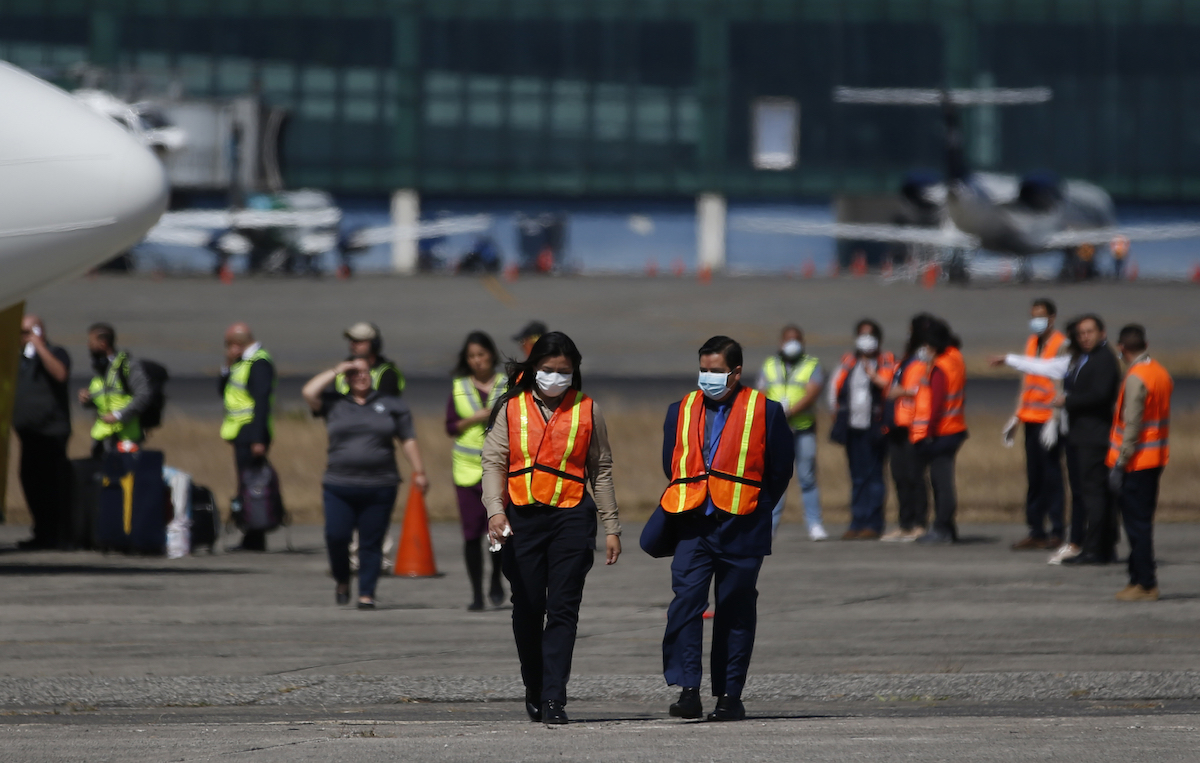

Immigration workers, wearing masks as a precaution against the spread of the new coronavirus, receive Guatemalans who were deported from the United States at La Aurora International airport in Guatemala City, Thursday, March 12, 2020. (AP Photo/Moisés Castillo)
Just recently, villagers in Quetzaltenango, Guatemala near
The truth is that our broken immigration system can’t handle the coronavirus.
In many immigration facilities, individuals are detained in large dormitory-style rooms littered with bunk-beds. The detention conditions are life-threatening with repo
Instead of coming out in front of this public health crisis by voluntarily considering the humanitarian release of immigrants who cannot be safely kept in these dangerous conditions, immigration officials are actively fighting against measures that would protect immigrants and communities at large. The humanitarian releas
To be clear, immigrants are not being detained pursuant to a criminal conviction. They are in civil detention awaiting the completion of immigration proceedings. Immigration officials have significant discretion to release detained immigrants, and regularly use alternatives to detention to maintain custody and control over non-citizens in immigration proceedings, such as supervised release, electronic ankle monitors, home confinement, and telephonic monitoring. But federal officials are reluctant to consider detention alternatives even for the most vulnerable immigrants with medical conditions that heighten their risk for COVID-19 infection, illnes
Humanitarian releases from dangerous immigration facilities are critically important, but the coronavirus also demands a high degree of international cooperation and coordination. Our response
Federal officials have been reluctant to test, treat, and support immigrants in the United States – and that must end. As public health officials call for making testing more widely available nationally, this must include immigrant communities, particularly those in detention facilities. Testing must be available across immigration facilities, including those in Bristol County, Massachusetts; Brownsville, Texas; and
Deported immigrants have often faced a toxic mix of extortion and stigma when they are forcibly returned to their home countries. They now face an even greater threat of violence and death in light of the coronavirus. Even in the best of times, government officials of all political stripes in Guatemala, El Salvador, and Honduras have failed to meaningfully protect and re-integrate deported immigrants into local communities. With the specter of infection looming, deported individuals will be more vulnerable than ever—and alone, abandoned altogether not just by their government, but also by neighbors who want to immolate them all. This requires a deliberate and intentional response to protect individuals across borders to make sure they are not deported to a death sentence.
By conducting business as usual, immigration officials are placing immigrants, the American public, and the world at risk of COVID-19 infection. The coronavirus requires a comprehensive and coordinated public health response —with dedicated resources for testing and treatment— at each stage of the immigration and deportation process, starting with conditions in detention facilities.
***
Iván Espinoza-Madrigal is the Executive Director of Lawyers for Civil Rights. Twitter: @IvanEspinozaESQ.



[…] Stop Deporting COVID-19 (OPINION) by @IvanEspinozaESQ https://www.latinorebels.com//2020/04/20/stopdeportingcovid19/ … […]
[…] Stop Deporting COVID-19 (OPINION) by @IvanEspinozaESQ of @LCRBOSTON #FreeThemAll https://www.latinorebels.com//2020/04/20/stopdeportingcovid19/ … […]
[…] By Iván Espinoza-Madrigal for LATINO REBELS Read Full Article HERE […]
[…] piece was originally posted on Latino Rebels here. Latino Rebels is part of Futuro Media Group, which produces Latino […]